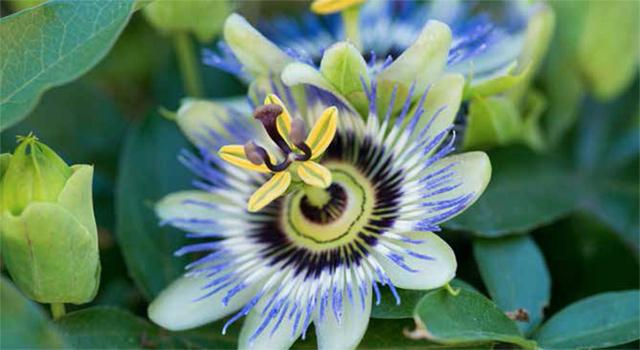- Mix
- Mon-2021-03-08 | 03:07 pm

The purple passionflower vine produces white flowers with purple, blue or pink calyx crown blooms. With its unusual blossoms, the woody vine has a reputation for treating many ailments. It grows in tropical and sub-tropical parts of the world and is widely used in Indian Ayurvedic medicine.
Therapeutic properties
Called by different names like Jamaican Honeysuckle, Apricot Vine and Water Lemon, the flower is used in many parts of the world for stress relief. The purple passionflower’s active alkaloid compound has shown promising results in reducing anxiety and stress, supporting bone health and improving immunity. It also helps reduce night sweats and insomnia. The paste of the flower can treat skin burns and inflammation. It has also shown to have a positive effect on Attention Deficit Hyperactivity Disorder in children.
Cosmetic contribution
The beautiful blossom of the passionflower vine is widely used in anti-ageing skin creams and hair tonics. The oil is extracted from the seeds of the fruit and is a vibrant yellow. Its antioxidant and nourishing quality (rich in Vitamin A and C, calcium and phosphorous) is particularly beneficial to acne and ageing skins. It is also used often as a hydrating moisturiser and in sunscreen creams because of its non-clogging property. Most passion flower products are available in health food stores.
Culinary craze
Edible flowers, like their herbal counterpart, are the new rage in contemporary cuisine. I use edible flowers more for an aesthetic appeal, flavour and the dramatic effect they add to a dish. If you plan to bring some flair to your next meal, think of edible flowers to garnish or bring out that sweet, peppery flavour to your dish. Violets, roses and lavenders lend a sweet taste to your salads and desserts. Drink a cup of passionflower tea by steeping a few dried petals in boiling water to give you grassy earthiness, sweetened with a few drops of honey for undisturbed sleep.
Side effects
Drowsiness and dizziness are potential side effects of consuming the herb in excess. Pregnant and breastfeeding women should avoid this herb. Always consult your doctor before trying herbal remedies.
Reprinted with permission from Family Flavours magazine
-
 Will Trump end up like Kennedy?2026-02-03
Will Trump end up like Kennedy?2026-02-03








